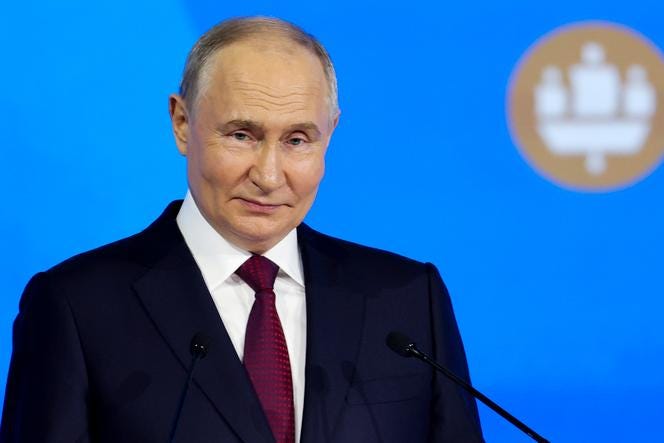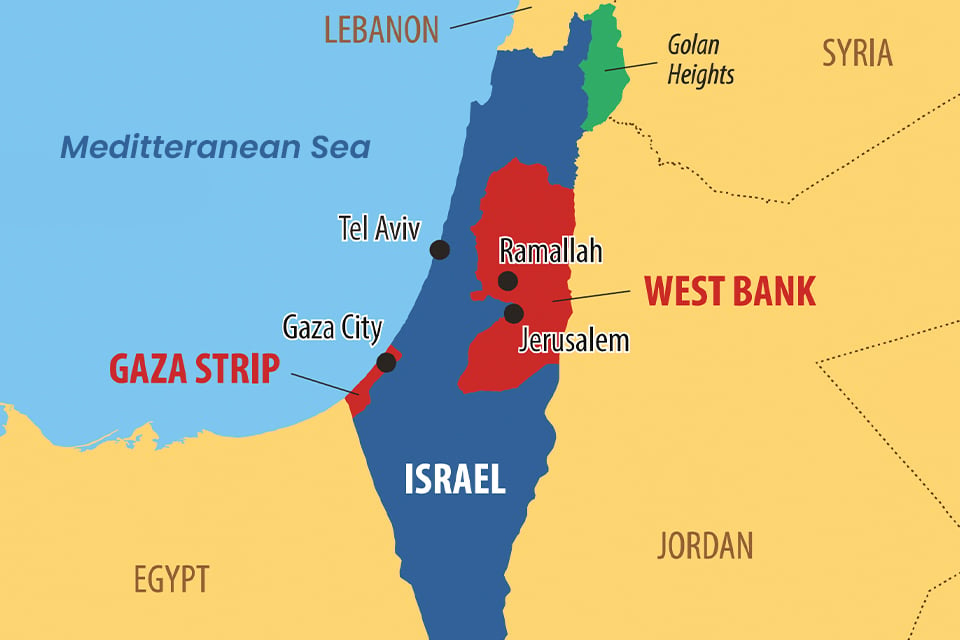10 Things Global News - 24th October 2025
Interesting and important news from around the world
Putin Dismisses U.S. Sanctions as Futile Pressure
EU Widens Russia Sanctions to Energy and Finance
EU Delays Asset-Backed Loan for Ukraine
Lithuania Protests Brief Russian Airspace Breach
Trump Threatens Land Strikes as Venezuela Tensions Rise
Trump Pauses SF ‘Surge’; East Bay on Alert
Xi’s Military Purge Elevates Anti-Graft Enforcer
U.S. Halts Canada Trade Talks Over Ontario Ad
US–China Trade Talks Open In Kuala Lumpur
Arab States Condemn West Bank Annexation Bills
On this day …..
On this day in October 1929, “Black Thursday” triggered the Wall Street Crash, wiping out fortunes, collapsing confidence, and plunging the global economy into the Great Depression.
The turmoil fed mass unemployment, political extremism, and lasting changes in state intervention. Ironically, the crash followed a period of rising interest rates as the Federal Reserve tried to curb speculation — a tightening that helped burst the bubble it sought to control.
Today’s markets are more regulated and closely scrutinised, yet heavily leveraged and globally interconnected.
The question remains: have we made finance safer, or just more complex and harder to contain?
Vladimir Putin has rejected Washington’s latest sanctions on Russia’s two biggest oil companies, Rosneft and Lukoil, insisting Moscow will not “bow to pressure” from the United States. He described the measures — imposed by President Donald Trump after cancelling a planned summit in Budapest — as an “unfriendly act” that damages relations. While conceding that “some losses are expected,” Putin said the sanctions would not significantly affect Russia’s economic stability.
Russian officials echoed his defiance, with former president Dmitry Medvedev calling the move an “act of war.” The Foreign Ministry warned the restrictions could “endanger global economic stability.”
Analysts noted that their impact will depend on whether India and China, key buyers of Russian oil, follow through on early signs of reduced imports, a shift that could weaken Moscow’s revenues and drive energy prices higher for these buyers.
Sources: Washington Post, The Guardian
The European Union has approved its nineteenth package of sanctions on Russia, tightening restrictions across the energy, banking, and technology sectors. The measures include a phased ban on Russian liquefied natural gas imports by 2027, a full transaction ban on Rosneft and Gazprom Neft, and new limits on Russia’s access to European financial and digital services. Five Russian banks and 117 vessels from Moscow’s so-called “shadow fleet” were also added to the blacklist.
EU officials said the package complements recent U.S. and U.K. sanctions, forming a coordinated Western push to curb Moscow’s war funding. Ukrainian President Volodymyr Zelensky praised the move as “a good signal” of unity.
China condemned the inclusion of its refineries and trading firms, calling the listings “illicit unilateral sanctions.” EU foreign policy chief Kaja Kallas said the measures would make it “increasingly hard for Putin to fund his invasion of Ukraine.”
Sources: Bloomberg, Reuters
EU leaders have deferred a decision on using frozen Russian assets to fund a €140bn “reparations loan” for Ukraine, pushing the issue to December after Belgium raised legal and financial concerns tied to Euroclear. Instead, the summit asked the European Commission to present options based on an assessment of Ukraine’s financing needs, while stating that Russian assets should remain immobilised until Moscow ends its war and compensates for the damage caused.

Despite the delay, leaders committed to cover Ukraine’s financial needs for the next two years. Commission President Ursula von der Leyen called the plan complex but said work would continue, and European Council President António Costa said the commitment should reassure Kyiv.
President Volodymyr Zelensky, who attended in Brussels, welcomed the outcome as a signal of political support. The debate came alongside a new EU sanctions package and fresh U.S. measures against Russian oil majors.
Sources: BBC, France 24
Lithuania said a Russian SU-30 fighter, accompanied by an IL-78 refuelling tanker, crossed from Kaliningrad and remained in its airspace for 18 seconds, penetrating about 700 metres near Kybartai. The Lithuanian air force detected the aircraft around 6 p.m., and two Spanish Eurofighters on NATO air policing duties were scrambled in response.
President Gitanas Nausėda called it a breach of international law and said the foreign ministry would summon Russian embassy representatives to lodge a protest.
Moscow denied any violation. Russia’s defence ministry said its SU-30s were conducting a planned training flight over the Kaliningrad region and had not crossed any borders. Lithuania’s complaint comes amid recent airspace incidents involving NATO members, which have prompted concerns about European security and air defence readiness, and led frontline states to press for stronger deterrence measures as incursions and drone overflights draw heightened scrutiny.
Sources: DW, South China Morning Post
U.S. President Donald Trump has warned that the next phase of his anti-drug campaign will target land operations, after weeks of U.S. military strikes on suspected drug-trafficking vessels in the Caribbean and Pacific. He said he would direct Defence Secretary Pete Hegseth to brief Congress, but dismissed the need for any declaration of war, declaring: “We’re just going to kill people that are bringing drugs into our country.”
The planned escalation has intensified tensions with Venezuela, where President Nicolás Maduro has deployed troops and distributed thousands of Russian-made surface-to-air missiles to counter possible U.S. attacks. Maduro urged citizens to prepare for “a general insurrectionary strike” if the country comes under fire.
Regional leaders have condemned Washington’s actions, with Colombia’s President Gustavo Petro accusing Trump of “extrajudicial executions” and Mexico warning that the U.S. strikes breach international law.
Sources: South China Morning Post, Al Jazeera
President Donald Trump has called off a planned federal “surge” in San Francisco after speaking with Mayor Daniel Lurie and city leaders. Lurie said Homeland Security Secretary Kristi Noem reaffirmed the stand-down. The plan had anticipated more than 100 Customs and Border Protection and other federal agents staging at the U.S. Coast Guard base in Alameda, where protesters gathered; police used flash-bang grenades as CBP vehicles passed.
The pause’s scope remained unclear. East Bay officials said they had “no information” about a wider stand-down as the Department of Homeland Security continued staging forces on Coast Guard Island.

Local leaders vowed to monitor developments and prepare legal responses, while rallies in San Francisco’s Embarcadero celebrated the pullback but urged vigilance. California officials criticised the administration’s approach, and community groups mobilised rapid-response support as residents awaited clarity on any operations beyond the city.
Sources: The Guardian, LA Times, Sacramento Bee
China has dismissed nine senior military officials, with state media accusing them of “severely undermining” party authority and challenging the system in which the Central Military Commission chair bears ultimate responsibility. The Oct. 17 purge removed several commanders and a Politburo member.
At a key meeting in Beijing this week, the Communist Party also replaced 11 Central Committee members and promoted Zhang Shengmin, the PLA’s anti-corruption chief, to second-ranked vice chair of the CMC, replacing He Weidong, who was expelled last week.
The shake-up is the largest single-day removal of military chiefs since Xi Jinping took power. At least 14 of the 79 generals appointed under Xi have now been officially ousted, including former defence ministers Wei Fenghe and Li Shangfu.
Only 168 of 205 Central Committee members attended the conclave, the lowest plenary turnout since the Cultural Revolution. Analysts said the sweeping cull underscores Xi’s determination to demonstrate control over the military command.
Sources: Bloomberg, ABC News
U.S. President Donald Trump says he is terminating all trade negotiations with Canada, citing an Ontario government advert that uses Ronald Reagan’s 1987 radio remarks to argue against tariffs.
In a late-night post on Truth Social, he called the ad “fraudulent” and said it aimed to influence an upcoming U.S. Supreme Court decision on the legality of his global tariffs. Trump has imposed a 35% levy on Canadian imports, with exemptions for goods that fall under USMCA.
The Reagan Presidential Foundation said the ad misrepresents the address and that it is reviewing legal options, while Ontario said it used an unedited public-domain excerpt. The province is spending C$75 million to air the spot on major U.S. networks.
Talks had been progressing in Washington after Prime Minister Mark Carney’s 7 October White House meeting, but Ottawa was informed shortly before Trump’s announcement that the negotiations were being scrapped.
Sources: BBC, CBC
Senior U.S. and Chinese officials are meeting in Kuala Lumpur from 24–27 October to defuse escalating trade tensions and keep a planned Trump–Xi encounter on track. U.S. Treasury Secretary Scott Bessent and Trade Representative Jamieson Greer are due to meet Vice-Premier He Lifeng from 25 October on the ASEAN Summit sidelines, after Washington threatened 100% tariffs from 1 November in response to China’s expanded export controls on rare earths.
The talks follow a fragile truce agreed in May that lowered U.S. tariffs to about 55% and restarted magnet shipments, before fraying after a wider U.S. export blacklist and Beijing’s 10 October controls requiring licences on rare earth-related products and technology.
China confirmed the Kuala Lumpur meetings and said they will address “important issues” in bilateral trade ties. With the truce set to expire on 10 November unless extended, both sides face pressure to avoid a renewed tariff escalation.
Sources: Straits Times, Bloomberg
Israel’s Knesset has given preliminary approval to two measures extending Israeli law to the occupied West Bank, including a separate bill on Maale Adumim. The votes, 25–24 and 31–9, now move to the Foreign Affairs and Defence Committee for debate. The step followed a month after U.S. President Donald Trump said he would not allow Israel to annex the West Bank, and came during a visit by U.S. Vice-President JD Vance.
Arab and Islamic states condemned the move. The Palestinian Foreign Ministry said Israel has no authority over Palestinian territory, while the OIC said the occupied territories form a single geographical entity.
A joint statement by 15 countries, the Arab League and the OIC denounced the bills as violations of international law, citing UN Security Council Resolution 2334 and an ICJ advisory opinion reaffirming obligations in the occupied Palestinian territories.














